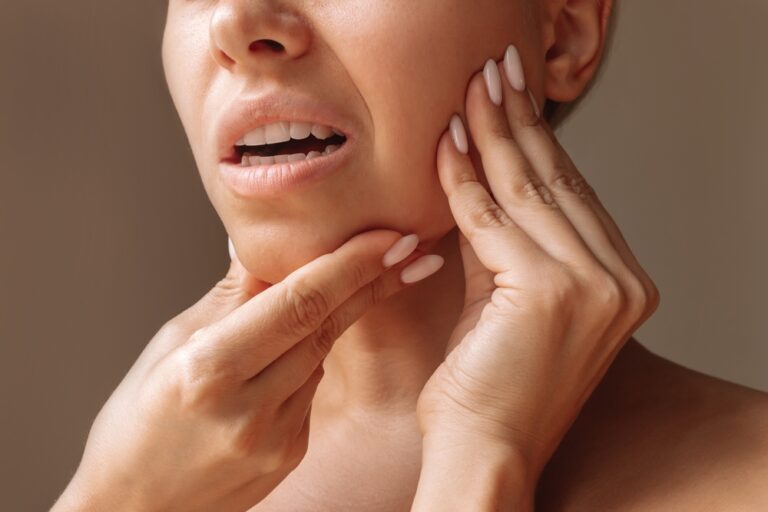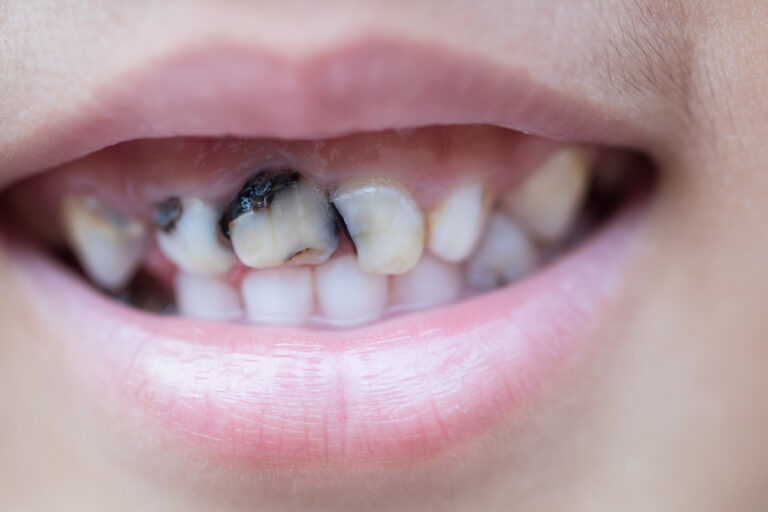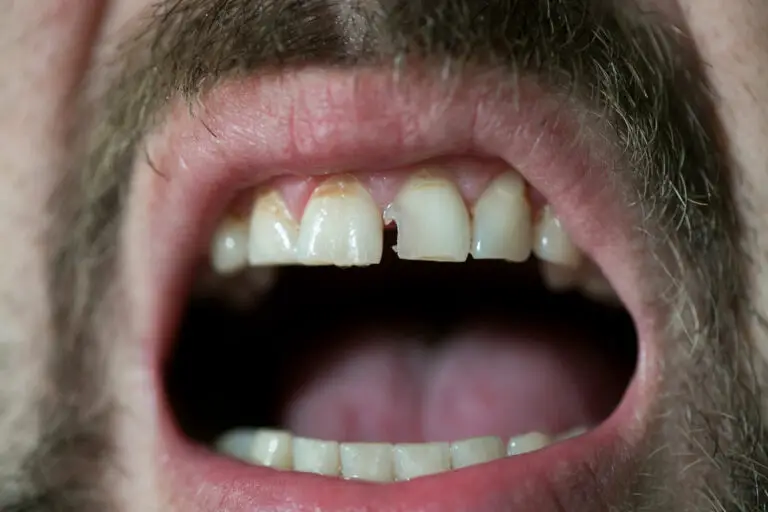Do you ever feel a sharp pain in your teeth when you eat or drink something hot, cold, sweet, or sour? If so, you may be experiencing tooth sensitivity. This common condition affects many people and can make eating and drinking uncomfortable. Fortunately, there are ways to get rid of tooth sensitivity and enjoy your favorite foods and drinks without pain.
One of the best ways to get rid of tooth sensitivity is to practice good oral hygiene. This includes brushing your teeth twice a day with a soft-bristled toothbrush and fluoride toothpaste, flossing daily, and using a mouthwash that is gentle on your teeth. You should also avoid brushing your teeth too hard or using an abrasive toothpaste, as this can wear away the protective enamel on your teeth and make them more sensitive. If you grind your teeth, talk to your dentist about getting a mouth guard to protect your teeth.
Another way to get rid of tooth sensitivity is to avoid foods and drinks that are known to trigger sensitivity. These may include hot or cold foods and drinks, acidic foods and drinks, and sugary foods and drinks. If you do consume these types of foods and drinks, try to eat or drink them quickly and avoid holding them in your mouth for too long. You can also try using a straw to drink cold or acidic beverages, as this can help to bypass your teeth and reduce sensitivity.
Understanding Sensitive Teeth

If you experience pain or discomfort in your teeth when eating or drinking hot, cold, sweet, or acidic foods, you may have sensitive teeth. Sensitive teeth are a common problem that affects millions of people worldwide.
To understand why your teeth are sensitive, you need to know a little bit about tooth anatomy. Each tooth has a hard outer layer called enamel, which protects the softer inner layer called dentin. Dentin contains tiny tubules that connect to the nerves in the pulp of the tooth. When the dentin is exposed, these tubules can become irritated, leading to pain or discomfort.
There are several factors that can contribute to sensitive teeth, including:
- Tooth decay or cavities
- Gum disease or recession
- Worn tooth enamel
- Cracked or chipped teeth
- Grinding or clenching teeth
- Excessive brushing or using a hard-bristled toothbrush
- Eating acidic foods or drinking acidic beverages
- Teeth whitening treatments
If you have sensitive teeth, it’s important to see your dentist to determine the underlying cause and to develop an appropriate treatment plan. In the next section, we’ll explore some of the treatments that may be recommended for sensitive teeth.
Causes of Sensitive Teeth
If you experience pain or discomfort when eating or drinking hot or cold foods, you may have sensitive teeth. Tooth sensitivity is a common dental problem that affects many people. Here are some of the most common causes of sensitive teeth:
Tooth Decay
Tooth decay, also known as cavities, is a common cause of tooth sensitivity. When tooth decay goes untreated, it can lead to the exposure of the sensitive inner layers of the tooth, causing pain and discomfort.
Gum Disease
Gum disease is another common cause of tooth sensitivity. When the gums become inflamed or infected, they can pull away from the teeth, exposing the sensitive roots.
Receding Gums
Receding gums occur when the gum tissue around the teeth pulls back, exposing the sensitive roots. This can be caused by a number of factors, including gum disease, brushing too hard, and aging.
Worn Tooth Enamel
Tooth enamel is the hard, protective outer layer of the tooth. When the enamel wears away, the sensitive inner layers of the tooth can be exposed, causing pain and discomfort. Enamel erosion can be caused by a number of factors, including acidic foods and drinks, brushing too hard, and grinding your teeth.
By understanding the common causes of sensitive teeth, you can take steps to prevent tooth sensitivity and protect your oral health.
Symptoms of Sensitive Teeth

If you have sensitive teeth, you may experience discomfort or pain when consuming certain foods or drinks. The symptoms of sensitive teeth can vary from person to person, but some common signs to look out for include:
- Sharp pain or discomfort in one or more teeth, especially when consuming hot, cold, sweet, or acidic foods and drinks.
- Pain or discomfort when brushing or flossing your teeth, especially around the gum line.
- Sensitivity to air or cold temperatures, such as when breathing in cold air.
- Aching or throbbing pain in your teeth or gums, especially when biting down on something hard.
If you experience any of these symptoms, it’s important to talk to your dentist. They can help you identify the cause of your tooth sensitivity and recommend appropriate treatment options.
It’s also worth noting that tooth sensitivity can be a sign of other dental problems, such as tooth decay or gum disease. So, if you’re experiencing persistent or severe tooth pain, it’s important to seek professional dental care as soon as possible.
In the next section, we’ll explore some common causes of sensitive teeth and what you can do to prevent or treat this condition.
Preventing Sensitive Teeth
If you have sensitive teeth, it’s important to take steps to prevent further damage to your teeth and reduce the discomfort you feel when eating. Here are some ways to prevent sensitive teeth:
Proper Oral Hygiene
Proper oral hygiene is essential for preventing sensitive teeth. Brush your teeth twice a day with a soft-bristled toothbrush and fluoride toothpaste. Use gentle strokes, rather than vigorous or harsh scrubbing, and avoid using an abrasive toothpaste. Floss daily to remove plaque and food particles from between your teeth.
Healthy Diet
A healthy diet can also help prevent sensitive teeth. Avoid sugary and acidic foods and drinks, which can erode your tooth enamel and cause sensitivity. Instead, eat a diet rich in fruits, vegetables, whole grains, and lean protein. Drinking plenty of water can also help keep your teeth healthy.
Regular Dental Check-ups
Regular dental check-ups are important for preventing sensitive teeth. Your dentist can identify early signs of tooth decay, gum disease, and other oral health problems that can lead to sensitivity. They can also recommend treatments to help prevent sensitivity, such as fluoride treatments or dental sealants.
By following these tips, you can help prevent sensitive teeth and maintain good oral health. If you do experience sensitivity, be sure to talk to your dentist about treatment options.
Treatment Options for Sensitive Teeth

If you experience tooth sensitivity when eating, there are several treatment options that can help alleviate your discomfort. Here are some common treatment options:
Desensitizing Toothpaste
Desensitizing toothpaste is a popular treatment option for sensitive teeth. It contains compounds that help block the transmission of pain signals from the tooth surface to the nerve. To get the best results, use the toothpaste regularly, at least twice a day. You may start to notice a decrease in sensitivity after a few weeks of use.
Fluoride Gel
Fluoride gel is another treatment option that can help reduce tooth sensitivity. It works by strengthening the enamel on your teeth, which can help protect the sensitive areas of your teeth. Your dentist may apply fluoride gel to your teeth during a dental visit, or you may be given a prescription for a fluoride gel that you can use at home.
Dental Procedures
In some cases, dental procedures may be necessary to treat tooth sensitivity. Some common procedures include:
- Bonding: A tooth-colored resin is applied to the surface of your teeth to cover exposed roots or cavities.
- Crown: A crown is a cap that is placed over a damaged tooth to protect it and reduce sensitivity.
- Inlay or Onlay: These are custom-made restorations that are used to repair damaged or decayed teeth.
- Root Canal: If your tooth sensitivity is caused by an infection or damage to the nerve of your tooth, a root canal may be necessary to remove the damaged tissue and protect the tooth.
It’s important to talk to your dentist about your tooth sensitivity and the best treatment options for your specific needs. With the right treatment, you can enjoy your favorite foods without discomfort.
Frequently Asked Questions
What causes tooth sensitivity when eating?
Tooth sensitivity when eating can be caused by a variety of factors, including worn tooth enamel, exposed tooth roots, gum recession, tooth decay, and cracked teeth. Other factors that can contribute to tooth sensitivity when eating include acidic foods and drinks, teeth grinding, and gum disease.
Are there any home remedies for sensitive teeth?
Yes, there are several home remedies that can help alleviate tooth sensitivity when eating. These include using desensitizing toothpaste, avoiding acidic foods and drinks, using a soft-bristled toothbrush, practicing good oral hygiene, and avoiding teeth grinding.
How can I prevent tooth sensitivity when eating?
To prevent tooth sensitivity when eating, it is important to practice good oral hygiene, avoid acidic foods and drinks, use a soft-bristled toothbrush, and avoid teeth grinding. Additionally, using a fluoride mouthwash and getting regular dental checkups can help prevent tooth sensitivity.
What toothpaste is best for sensitive teeth?
There are several toothpastes that are designed specifically for sensitive teeth, including Sensodyne, Colgate Sensitive, and Crest Pro-Health. These toothpastes contain ingredients that help to block pain signals and protect exposed tooth roots.
Can sensitive teeth be cured?
While there is no cure for sensitive teeth, there are several treatments that can help alleviate tooth sensitivity when eating. These include using desensitizing toothpaste, getting a fluoride treatment, using a mouthguard to prevent teeth grinding, and getting dental restorations to repair cracked teeth.
When should I see a dentist for tooth sensitivity?
If you are experiencing tooth sensitivity when eating, it is important to see a dentist as soon as possible. Your dentist can determine the cause of your tooth sensitivity and recommend appropriate treatments to alleviate your symptoms. Additionally, if you are experiencing severe tooth pain or swelling, you should seek immediate dental care.







